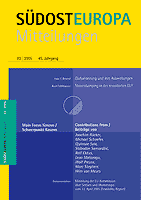Globalisierung und ihre Auswirkungen auf Industrie-, Transformations- und Entwicklungsländer
Globalisation and Its Effects on Industrial, Transformation and Developing Countries
Author(s): T. Iván BerendSubject(s): Politics / Political Sciences
Published by: Südosteuropa Gesellschaft e.V.
Summary/Abstract: In the last quarter of the 20th century economic interactions, trade, capital flow, establishment of subsidiaries by multinational companies and production abroad as well as financial transactions dramatically increased. A new international division of labor within industries mostly replaced the old industrial-agrarian exchange. These development transformed core-periphery relations. Globalization was accompanied by a neo-conservative revolution, which globalized market fundamentalism. As a consequence, the gap between core and periphery increased. The income disparity between the poorest and richest countries jumped from 1:26 in 1950 to 1:40 by the 1990s. Globalization, nevertheless, is not a one-way road. Based on internal pre-requisites, however, peripheral countries did not react uniformly. Several former peripheral countries profited from globalization and began catching up in Asia, Mediterranean and Northern Europe. The same trend is appearing in Central and Eastern Europe as well.
Journal: Südosteuropa Mitteilungen
- Issue Year: 2005
- Issue No: 03
- Page Range: 4-15
- Page Count: 12
- Language: German
- Content File-PDF

